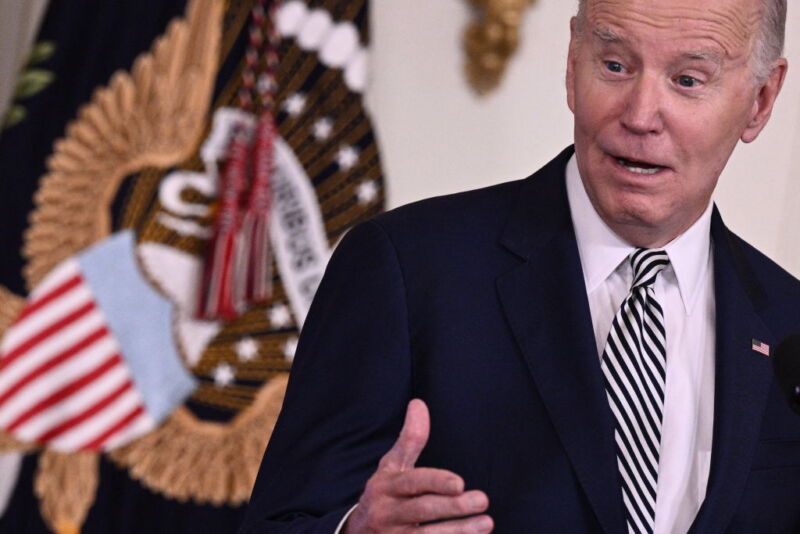 reader comments 25
reader comments 25 The White House has announced the "first government-wide policy to mitigate risks of artificial intelligence (AI) and harness its benefits." To coordinate these efforts, every federal agency must appoint a chief AI officer with "significant expertise in AI."
Some agencies have already appointed chief AI officers, but any agency that has not must appoint a senior official over the next 60 days. If an official already appointed as a chief AI officer does not have the necessary authority to coordinate AI use in the agency, they must be granted additional authority or else a new chief AI officer must be named.
Ideal candidates, the White House recommended, might include chief information officers, chief data officers, or chief technology officers, the Office of Management and Budget (OMB) policy said.
As chief AI officers, appointees will serve as senior advisers on AI initiatives, monitoring and inventorying all agency uses of AI. They must conduct risk assessments to consider whether any AI uses are impacting "safety, security, civil rights, civil liberties, privacy, democratic values, human rights, equal opportunities, worker well-being, access to critical resources and services, agency trust and credibility, and market competition," OMB said.
Perhaps most urgently, by December 1, the officers must correct all non-compliant AI uses in government, unless an extension of up to one year is granted.
The chief AI officers will seemingly enjoy a lot of power and oversight over how the government uses AI. It's up to the chief AI officers to develop a plan to comply with minimum safety standards and to work with chief financial and human resource officers to develop the necessary budgets and workforces to use AI to further each agency's mission and ensure "equitable outcomes," OMB said. Here's a brief summary of OMB's ideals:
Agencies are encouraged to prioritize AI development and adoption for the public good and where the technology can be helpful in understanding and tackling large societal challenges, such as using AI to improve the accessibility of government services, reduce food insecurity, address the climate crisis, improve public health, advance equitable outcomes, protect democracy and human rights, and grow economic competitiveness in a way that benefits people across the United States.
Among the chief AI officer's primary responsibilities is determining what AI uses might impact the safety or rights of US citizens. They'll do this by assessing AI impacts, conducting real-world tests, independently evaluating AI, regularly evaluating risks, properly training staff, providing additional human oversight where necessary, and giving public notice of any AI use that could have a "significant impact on rights or safety," OMB said.
AdvertisementOMB breaks down several AI uses that could impact safety, including controlling "safety-critical functions" within everything from emergency services to food-safety mechanisms to systems controlling nuclear reactors. Using AI to maintain election integrity could be safety-impacting, too, as could using AI to move industrial waste, control health insurance costs, or detect the "presence of dangerous weapons."
Uses of AI presumed to be rights-impacting include censoring protected speech and a wide range of law enforcement efforts, such as predicting crimes, sketching faces, or using license plate readers to track personal vehicles in public spaces. Other rights-impacting AI uses include "risk assessments related to immigration," "replicating a person’s likeness or voice without express consent," or detecting students cheating.
Chief AI officers will ultimately decide if any AI use is safety- or rights-impacting and must adhere to OMB's minimum standards for responsible AI use. Once a determination is made, the officers will "centrally track" the determinations, informing OMB of any major changes to "conditions or context in which the AI is used." The officers will also regularly convene "a new Chief AI Officer Council to coordinate" efforts and share innovations government-wide.
As agencies advance AI uses—which the White House says is critical to "strengthen AI safety and security, protect Americans’ privacy, advance equity and civil rights, stand up for consumers and workers, promote innovation and competition, advance American leadership around the world, and more"—chief AI officers will become the public-facing figures accountable for decisions made. In that role, the officer must consult with the public and incorporate "feedback from affected communities," notify "negatively affected individuals" of new AI uses, and maintain options to opt-out of "AI-enabled decisions," OMB said.
However, OMB noted that chief AI officers also have the power to waive opt-out options "if they can demonstrate that a human alternative would result in a service that is less fair (e.g., produces a disparate impact on protected classes) or if an opt-out would impose undue hardship on the agency."



















